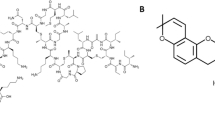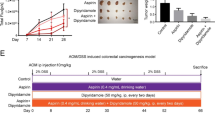Abstract
Various biochemical, clinical and epidemiological studies have shown that aspirin (ASA) and other nonsteroidal anti-inflammatory drugs (NSAIDs) demonstrate antineoplastic properties, particularly in the gastrointestinal tract, inhibiting the proliferation of colorectal cancer cells. The mechanism of action may be prostaglandin mediated through inhibition of the COX enzymatic system. This includes two iso-enzymes, COX-I and COX-II, working in concert with the activation of apoptosis, activation of immune surveillance, inhibition of proliferation, and inhibition of carcinogen activation. 5-Fluorouracil (5-FU) has demonstrated activity against colorectal cancer, leading to apoptosis of neoplastic cells. We evaluated the effects of varying doses of ASA (0.5, 1, 1.5 mM), both as a single agent and in combination with 5-FU (50 μg) in HT-29, a colon adenocarcinoma cell line. Proliferation assays showed that aspirin at a concentration of 1 mM inhibits cell growth. Cells treated with ASA, both alone and in combination with 5-FU, demonstrated apoptotic activity with the up-regulation of Bax protein, which is consistent with 5-FU anticancer treatment. Furthermore, there was synergistic cell death with ASA and 5-FU. DNA fragmentation, TUNEL, and trypan blue exclusion methods indicated that a combination of ASA and 5-FU induces apoptosis in cells in a time- and concentration-dependent manner. This study serves to further elucidate the mechanism of action of ASA, and ASA in combination with 5-FU, in colorectal cancer as evidenced by its effect on the HT-29 cell line.
Similar content being viewed by others
Refrences
Kune GA, Kune S, Watson LF: Colorectal cancer risk, chronic illnesses, operations, and medications: case control results from the Melbourne Colorectal Cancer Study. Cancer Res 48:4399–4404, 1988
Rosenberg L, Palmer JR, Zauber AG, Warshauer ME, Stolley PD, Shapiro S: A hypothesis: nonsteroidal anti–inflammatory drugs reduce the incidence of large-bowel cancer. J Natl Cancer Inst 83:355–358, 1991
Giovannucci E, Egan KM, Hunter DJ, Stampfer MJ, Colditz GA, Willett WC, Speizer FE: Aspirin and the risk of colorectal cancer in women. N Engl J Med 333:609–614, 1995
Rao CV, Rivenson A, Simi B, Zang E, Kelloff G, Steele V, Reddy BS: Chemoprevention of colon carcinogenesis by sulindac, a nonsteroidal anti-inflammatory agent. Cancer Res 55:1464–1472, 1995
Thun MJ, Namboodiri MM, Calle EE, Flanders WD, Heath CW Jr: Aspirin use and risk of fatal cancer. Cancer Res 53:1322–1327, 1993
Garcia–Rodriguez LA, Huerta–Alvarez C: Reduced risk of colorectal cancer among long–term users of aspirin and nonaspirin nonsteroidal antiinflammatory drugs. Epidemiology 12:88–93, 2001
Katsuki S, Oui M, Takayama T, Takahashi Y, Shuichi N, Niitsu Y: Aberrant crypt foci as biomarkers in chemoprevention for colorectal cancer. Nippon Geka Gakkai Zasshi 99:379–384, 1998
Zhang H, Sun XF: Overexpression of cyclooxygenase–2 correlates with advanced stages of colorectal cancer. Am J Gastroenterol 97:1037–1041, 2002
Bush JA, Li G: Regulation of the Mdr1 isoforms in a p53–deficient mouse model. Carcinogenesis 23:1603–1607, 2002
Martin C, Connelly A, Keku TO, Mountcastle SB, Galanko J, Woosley JT, Schliebe B, Lund PK, Sandler RS: Nonsteroidal anti-inflammatory drugs, apoptosis, and colorectal adenomas. Gastroenterology 123:1770–1777, 2002
Shiff SJ, Koutsos MI, Qiao L, Rigas B: Nonsteroidal antiinflammatory drugs inhibit the proliferation of colon adenocarcinoma cells: effects on cell cycle and apoptosis. Exp Cell Res 222:179–188, 1996
Qiao LS, Steven J, Rigas B: Experimental Cancer Sulindac sulfide alters the expression of cyclin proteins in HT–29 colon adenocarcinoma cells. Int J Cancer 1998;76:99–104
Bayer BM, Beaven MA: Evidence that indomethacin reversibly inhibits cell growth in the G1 phase of the cell cycle. Biochem Pharmacol 28:441–443, 1979
Piazza GA, Rahm AL, Krutzsch M, et al.: Antineoplastic drugs sulindac sulfide and sulfone inhibit cell growth by inducing apoptosis. Cancer Res 55:3110–3116, 1995
Arber N, Han EK, Sgambato A, Piazza GA, Delohery TM, Begemann M, Weghorst CM, Kim NH, Pamukcu R, Ahnen DJ, Reed JC, Weinstein IB, Holt PR: A K-ras oncogene increases resistance to sulindac-induced apoptosis in rat enterocytes. Gastroenterology 113:1892–1900, 1997
Ansari B, Coates PJ, Greenstein BD, Hall PA: In situ end–labelling detects DNA strand breaks in apoptosis and other physiological and pathological states. J Pathol 170:1–8, 1993
Eaden J: Review article: the data supporting a role for aminosalicylates in the chemoprevention of colorectal cancer in patients with inflammatory bowel disease. Aliment Pharmacol Ther 2:15–21, 2003
Ricchi P, Di Matola T, Ruggiero G, Zanzi D, Apicella A, di Palma A, Pensabene M, Pignata S, Zarrilli R, Acquaviva AM: Effect of non-steroidal anti-inflammatory drugs on colon carcinoma Caco–2 cell responsiveness to topoisomerase inhibitor drugs. Br J Cancer 86:1501–1509, 2002
Barratt PL, Seymour MT, Stenning SP, Georgiades I, Walker C, Birbeck K, Quirke P: DNA markers predicting benefit from adjuvant fluorouracil in patients with colon cancer: a molecular study. Lancet 360:1381–1391, 2002
Sugamura K, Makino M, Shirai H, Kimura O, Maeta M, Itoh H, Kaibara N: Enhanced induction of apoptosis of human gastric carcinoma cells after preoperative treatment with 5–fluorouracil. Cancer 79:12–17, 1997
Waxman DJ, Schwartz PS: Harnessing apoptosis for improved anticancer gene therapy. Cancer Res 63:8563–8572, 2003
Violette S, Poulain L, Dussaulx E, Pepin D, Faussat AM, Chambaz J, Lacorte JM, Staedel C, Lesuffleur T: Resistance of colon cancer cells to long–term 5–fluorouracil exposure is correlated to the relative level of Bcl–2 and Bcl–X(L) in addition to Bax and p53 status. Int J Cancer 98:498–504, 2002
Theodorakis P, Lomonosova E, Chinnadurai G: Critical requirement of BAX for manifestation of apoptosis induced by multiple stimuli in human epithelial cancer cells. Cancer Res 62:3373–3376, 2002
Oh KW, Qian T, Brenner DA, Lemasters JJ: Salicylate enhances necrosis and apoptosis mediated by the mitochondrial permeability transition. Toxicol Sci 73:44–52, 2003
Giardiello FM, Yang VW, Hylind LM, Krush AJ, Petersen GM, Trimbath JD, Piantadosi S, Garrett E, Geiman DE, Hubbard W, Offerhaus GJ, Hamilton SR: Primary chemoprevention of familial adenomatous polyposis with sulindac. N Engl J Med 346:1054–1059, 2002
Author information
Authors and Affiliations
Corresponding author
Rights and permissions
About this article
Cite this article
Ashktorab, H., Dawkins, F.W., Mohamed, R. et al. Apoptosis Induced by Aspirin and 5-Fluorouracil in Human Colonic Adenocarcinoma Cells. Dig Dis Sci 50, 1025–1032 (2005). https://doi.org/10.1007/s10620-005-2698-2
Received:
Accepted:
Published:
Issue Date:
DOI: https://doi.org/10.1007/s10620-005-2698-2




